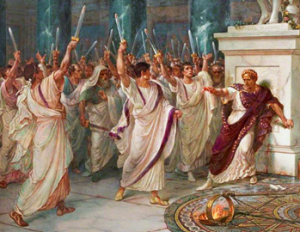

Classical languages and the study of Classical Civilisations is a dying subject, οἰμοι! Many people believe they are not worth studying, so what’s the point? I’m here to try to convince you that Classics is still important, and even better, is totally worth studying.
The basis of… everything.
Philosophy, language, literature, history, religion, art, architecture, politics, maths and science, are often influenced in one way or another from classical civilisations, meaning the ancient Greeks and Romans, (and Egyptians, Mayans, and many others but we won’t get into that now.) Studying these topics through Classics is a holistic way to combine everything!
You know more than you think.
Many parts of everyday life today have been influenced by Classics, and you may not even have realised. The famous phrase you might see on an inspirational poster in school, ‘Carpe Diem!’ means ‘Seize the day!’ and was created by the Roman satirist Horace. The (brilliant) Queen song ‘Another One Bites the Dust,’ is influenced by the lines in Homer’s ‘Iliad’ where soldiers would ‘bite the dust’ on the battlefield during the Trojan War. Julius Caesar, who the salad is NOT named after, reformed the Roman’s calendar and created the months of January and February, and re-named two other months to July and August to honour himself and his adopted son, Augustus, (yes, the one who became the first emperor of Rome.) If you truly think about it, you could argue that Classics is not dying, as it is forever embedded into our modern-day world.
FUN FACT: Many English words stem from Latin, which was heavily influenced by Greek, for example, a kleptomaniac is someone who can’t resist stealing, and κλεπτω (klepto) in ancient Greek means ‘I steal.’

Don’t make the same mistakes.
Humans tend to make the same mistakes over and over again; wars, revolts, political assassinations and waiting to the very last minute to start that essay due next week. Human error, it is unavoidable. However, studying Ancient History, you can see how, in some ways, modern society isn’t so far off. Julius Caesar was assassinated, Spartacus lead the slaves in a revolt, there was plagues that lead to quarantines and isolations, sound familiar? Studying history gives new generations the chance to not make the same mistakes, and grow to reach different outcomes, but that can’t be done until you know what to avoid doing by studying the past.
The fun stuff.
If that hasn’t convinced you to love Classics, I’ll give it one more go. Have you read ‘Percy Jackson?’ ‘The Song of Achilles?’ ‘Pandora’s Jar?’ Do you love the Disney film ‘Hercules?’ Or watching Brad Pitt or Diane Kruger in the remake of ‘Troy?’ Have you watched the hilarious comedy show ‘Plebs?’ Classics in modern day media, inaccuracies excluded, is a fantastic way of sparking an interest in Classics.
FUN FACT: The derogatory term ‘pleb’ comes from the Roman social class ‘Plebians.’ Free, Roman citizens, (only men of age were cast as citizens, not children, women or slaves,) in the working class.

Final say.
Classics is, truly, all around us, and I hope will be forever. It is an exciting subject with so many different sub-categories within it, and so many different approaches to studying it, and scholars are always discovering something new. So hopefully you agree, Classics is still important today.
By Amber, Classical Studies BA, Kings College London.
Links for further interest:
Studying Classics at King’s, Undergraduate, here.
Good books for beginners interest in Classics, here.
Mythological fiction, for an easier start, here.

Leave a Reply